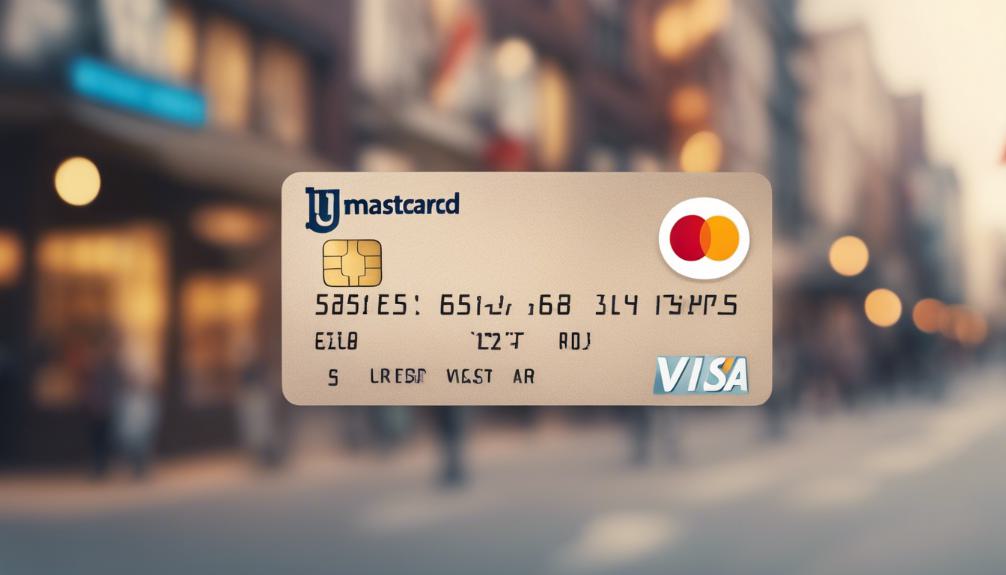Visa, Mastercard Swipe Fee Settlement Reached
The recent $5.6 billion settlement reached in the antitrust litigation against Visa and Mastercard marks a pivotal moment in the oversight of swipe fees and merchant practices. This settlement, encompassing claims from as far back as January 1, 2004, through January 25, 2019, offers a significant opportunity for compensation to affected merchants. However, with the commencement of claim form mailings and a definitive deadline set for May 31, 2024, the intricacies of the claim submission process and eligibility criteria become important elements for potential claimants to understand. This complex landscape invites a closer examination of the legal ramifications and the strategic steps merchants must undertake to navigate this settlement effectively.
Key Takeaways
- Merchants who accepted Visa or Mastercard between 2004 and 2019 may be eligible for a share of the $5.6 billion settlement.
- The settlement resolves allegations of antitrust violations related to high swipe fees and restrictive card acceptance rules.
- To receive a settlement payout, eligible merchants must file a claim by the May 31, 2024, deadline.
- The case, which has been ongoing since 2005, covers approximately 18 million businesses impacted by the fee structures.
Settlement Overview

The $5.6 billion settlement reached between Visa, Mastercard, and millions of merchants marks a significant resolution to the longstanding antitrust case involving alleged excessive swipe fees and restrictive practices. This landmark agreement addresses grievances dating back to 2004, offering a path toward financial redress for approximately 18 million businesses impacted by these fees, which traditionally ranged from 1% to 2% of the transaction amount. The settlement not only underscores the importance of fair commerce practices but also reflects a commitment to supporting the backbone of the economy—small and medium-sized enterprises. By rectifying these alleged unfair practices, the settlement aims to foster a more equitable business environment, ensuring that merchants can continue to serve their communities effectively and sustainably.
Eligibility Criteria

To qualify for a portion of the $5.6 billion settlement, businesses must have accepted Visa or Mastercard transactions between January 1, 2004, and January 25, 2019. This eligibility criteria encompasses a wide range of merchants, from small local shops to large corporations, reflecting the settlement's intention to address the concerns of all affected parties. By encompassing such a broad timeframe, the settlement aims to guarantee that those who have been impacted by the alleged antitrust behaviors have an opportunity to seek redress. It is a pivotal step towards rectifying the financial burdens placed on businesses due to high swipe fees, offering a path to compensation for those dedicated to serving their communities and customers with integrity and fairness.
Claim Submission Process

Eligible merchants aiming to receive compensation from the $5.6 billion settlement must navigate the claim submission process diligently. It's a critical step for those who accepted Visa or Mastercard payments between January 1, 2004, and January 25, 2019, and wish to benefit from the lawsuit's resolution. The process has been simplified to encourage participation, with claim forms distributed starting December 1, 2023, and a final submission deadline of May 31, 2024. No Claimant ID or Control Number is required for submission, making it accessible to all eligible merchants. Successfully completing this process is necessary for securing a rightful share of the settlement, underscoring the importance of timely and accurate application. This initiative is a pivotal opportunity for merchants to recover funds proportionate to the swipe fees incurred, reinforcing the value of attentive claim management.
Scam Prevention Tips

Often, scammers exploit high-profile settlements like the Visa and Mastercard case to deceive merchants with fake websites and unsolicited calls. In the spirit of serving others and guaranteeing the integrity of the settlement process, it is crucial to approach any communication regarding the settlement with caution. Validate the authenticity of any website or caller claiming to represent the settlement by contacting the official settlement administrator directly. Be cautious of any request for personal or financial information and do not click on links in unsolicited emails or messages. By staying informed and vigilant, merchants can safeguard themselves from scams and make sure that they rightfully claim their share of the settlement without falling prey to fraudulent schemes.
Legal Assistance Options

Understanding the complexities of the Visa and Mastercard swipe fee settlement, seeking expert legal assistance emerges as a prudent step for merchants aiming to navigate the claim process effectively. The settlement, involving billions and affecting millions of businesses, represents a significant legal undertaking. Expert legal guidance guarantees that merchants can confidently participate in the settlement, maximizing their potential compensation while minimizing risks. Entities such as Top Class Actions and Legafi Law offer specialized support for claim filing and dispute resolution, providing a safeguard against potential pitfalls. For those dedicated to serving their communities through their businesses, engaging with reputable legal professionals is not just an investment in their individual claim, but a commitment to maintaining the integrity and viability of their operations amidst complex legal landscapes.
Agreement and Representation

Understanding the complexities of the legal agreement and representation is essential for merchants involved in the Visa and Mastercard swipe fee settlement. The settlement, addressing claims of anticompetitive practices by Visa and Mastercard, mandates merchants to work through intricate legal documents and representation agreements. These documents delineate the scope of counsel's authority, the detailed terms of engagement, and the mechanisms for dispute resolution, including arbitration. Merchants must acknowledge their understanding of these terms, ensuring they are fully aware of their rights and the extent of their legal representation's responsibilities. Engaging with a reputable legal team, familiar with the settlement's nuances, empowers merchants to safeguard their interests effectively. This professional guidance is pivotal in maneuvering the settlement process, ensuring merchants are aptly represented and their claims are accurately filed and managed.
Next Steps for Merchants

To navigate the Visa and Mastercard swipe fee settlement effectively, merchants should first verify their eligibility for the claim by confirming their acceptance of these cards during the specified period. Upon establishing eligibility, the next important step is to meticulously gather and prepare all necessary documentation that substantiates the claim. This includes records of transactions processed using Visa or Mastercard, any correspondence or contracts with the payment processors, and financial statements highlighting the incurred swipe fees.
Merchants are encouraged to file their claims as promptly as possible before the deadline on May 31, 2024, to guarantee their participation in the settlement. Engaging with reputable legal counsel or services that specialize in such settlements can provide valuable guidance through the claim process, safeguarding merchants from potential scams and ensuring that they receive the compensation they rightfully deserve for the excessive fees charged.
Frequently Asked Questions
How Will the Settlement Amount Be Distributed Among the Eligible Merchants?**
The distribution of the $5.6 billion settlement amount among eligible merchants will be based on a structured formula that takes into account the volume of Visa and Mastercard transactions processed by each merchant between January 1, 2004, and January 25, 2019. Merchants must file a claim to participate in the settlement distribution, ensuring they receive a proportionate share of the settlement relative to their transaction volume during the specified period.
This Question Inquires About the Specific Allocation Methodology of the $5.6 Billion Settlement Among the 18 Million Potentially Eligible Businesses, a Detail That Might Not Be Explicitly Covered in the Sections Provided.
The allocation methodology for distributing the $5.6 billion settlement among potentially eligible businesses has not been detailed explicitly. However, it is presumed that the distribution mechanism will consider factors such as the volume of transactions processed and the duration of Visa or Mastercard usage within the specified period. Businesses seeking a portion of the settlement are advised to file a claim to guarantee they are considered for compensation.
What Implications Does This Settlement Have for Future Credit Card Processing Fees?**
Plotting the future of credit card processing fees post-settlement is akin to mapping a course through uncharted waters. With a landmark $5.6 billion agreement reached, signaling a pivotal moment for 18 million businesses impacted by past fee structures, this settlement may serve as a beacon guiding towards more transparent and equitable fee practices. It beckons the industry towards a future where serving merchants and consumers with fairness becomes the compass guiding all transactions.
Merchants and Observers Might Be Curious About Whether the Settlement Will Lead to Changes in Visa and Mastercard's Fee Structures or Rules Governing Merchant Transactions Going Forward, Which Might Not Be Directly Addressed in the Settlement Details.
Merchants and industry observers are naturally inquisitive about the potential implications of the recent legal developments on Visa and Mastercard's fee structures and the rules governing merchant transactions. While the settlement primarily addresses past practices and compensations, it remains uncertain how this resolution might influence future policies or fee adjustments. Stakeholders are advised to monitor any updates from Visa and Mastercard closely, as these could impact operational costs and compliance requirements moving forward.
Can Merchants Who Join the Settlement Still Pursue Individual Litigation Against Visa and Mastercard for Related Issues?**
Traversing the maze of legal recourse, merchants contemplate whether joining the collective resolution precludes paths to individual justice against towering giants. For those devoted to serving their communities, it is crucial to grasp that participation in this settlement does not hinder the pursuit of separate litigation for related grievances. Each merchant retains the sovereign right to seek additional redress, guaranteeing their quest for equitable treatment within the marketplace remains undeterred.
Conclusion
To summarize, the historic $5.6 billion settlement against Visa and Mastercard marks a significant milestone in antitrust litigation, offering a form of redress for the alleged financial burdens imposed on merchants due to excessive swipe fees and restrictive practices. Who would have thought that after years of legal battles, a resolution of this magnitude would be achieved? This development not only underscores the importance of holding corporations accountable but also highlights the potential for collective action to effectuate significant changes. Merchants impacted by these practices are encouraged to act swiftly to claim their portion of the settlement, ensuring they are compensated for past grievances.

This post has been generated by AI and was not reviewed by editors. This is Not legal advice. Please consult with an attorney.